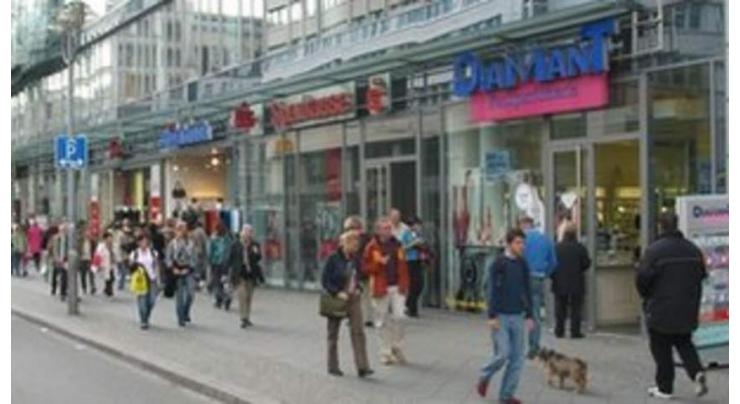
German Prices Fell 0.1% In July, First Contraction Since 2016
Faizan Hashmi Published July 31, 2020 | 12:56 AM

Prices in Germany's pandemic-hit economy fell by 0.1 percent year-on-year in July, official data showed Thursday, the first time inflation has turned negative since April 2016
Frankfurt am Main, (APP - UrduPoint / Pakistan Point News - 30th Jul, 2020 ):Prices in Germany's pandemic-hit economy fell by 0.1 percent year-on-year in July, official data showed Thursday, the first time inflation has turned negative since April 2016.
Federal statistics agency Destatis said the plunge, which comes after prices grew 0.9 percent in June, was partly influenced by falling energy prices and the German government's temporary cut in value-added taxes.
The VAT reduction went into effect on July 1 and is a key element of stimulus efforts aimed at helping Europe's top economy recover from the coronavirus-induced recession.
Analysts surveyed by Factset had expected price growth of 0.1 percent for July.
The reading, based on preliminary data, comes after another large EU economy, Spain, also saw inflation slip into negative territory (-0.7 percent) this month as the hard-hit travel sector cut rates on hotels and tourism.
The figures raise the spectre of deflation in the eurozone and are likely to cause some anxiety at the European Central Bank.
Deflation, or an extended period of falling prices, can be harmful for the economy when it deters consumers from spending in anticipation of even cheaper prices, creating pressure on businesses who may end up cutting jobs.
Germany's VAT reduction is only set to last until December 31, however.
The ECB has in recent years unleashed huge stimulus to drive up economic growth and push inflation up to its target of close to, but below two percent.
It has bought nearly three trillion euros in government and corporate bonds since 2015, held interest rates at record lows and offered ultra-cheap loans to banks to encourage spending and investment.
The economic devastation wrought by the coronavirus has seen the Frankfurt institution ramp up those efforts with an additional 1.3-trillion euro "pandemic emergency" bond-buying scheme.
Using the ECB's preferred yardstick, known as the Harmonised Index of Consumer Prices (HICP), German inflation showed zero growth in July year-on-year.
In a month-on-month comparison, HICP inflation turned negative at -0.5 percent.
Related Topics
Recent Stories

Bugti assures transporters for addressing their problems

Deputy Prime Minister and Foreign Minister, Mohammad Ishaq Dar meets foreign min ..

3 drug peddlers arrested, hashish recovered

1496,990 children given polio drops in five days: DC

Six terrorists killed, hideout busted in N Waziristan IBO: ISPR

Pakistan, Qatar agree to further expand trade, investment ties

Sindh cabinet approves Rs177.5m to strengthen, mobilize various wings of police

Faisal Karim Kundi takes oath as new KP Governor

Azad Jammu and Kashmir Prime Minister Anwaar ul Haq Chaudhry seeks more vibrant ..

Tahaffuz Manzil Foster Home providing care & support to homeless children

PCB proposes April 7 -May 20 window; tweaks in rules for HBL PSL 2025

Field hospitals now operational across Punjab: Azma Bukhari
More Stories From World
-
Football: French Ligue 1 results - collated
6 hours ago -
Football: Italian Serie A results - collated
6 hours ago -
European Champions Cup semi-final result
7 hours ago -
Football: Italian Serie A table
7 hours ago -
Tennis: WTA Madrid Open results
7 hours ago -
Formula One: Miami Grand Prix sprint race results
7 hours ago
-
Barca have 'huge amount' to change next season: coach Xavi
7 hours ago -
Haaland 'back to business' with four-goal haul in Man City rout of Wolves
7 hours ago -
Newcomer Bellingham Madrid's driving force in La Liga conquest
7 hours ago -
Girona players have made history, says coach after reaching Champions League
7 hours ago -
Reus begins farewell tour while Bayern stumble in Stuttgart
7 hours ago -
Real Madrid La Liga title win in numbers
8 hours ago